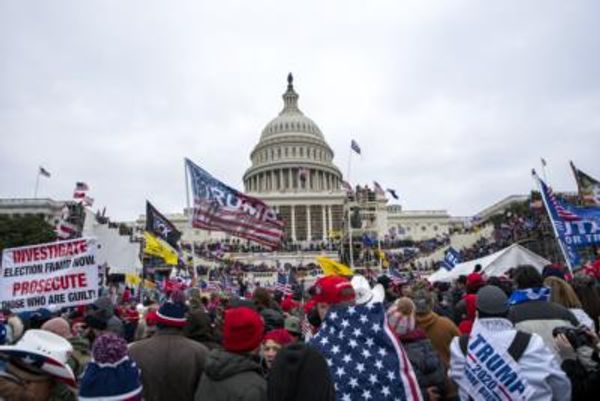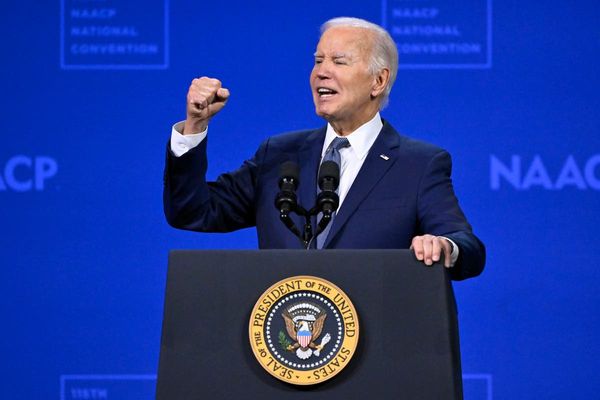
US prosecutors are “beginning to offer retooled plea deals” and drop charges in cases related to the January 6 attack on Congress, CNN said, citing legal filings in the weeks since the rightwing-dominated US supreme court narrowed how prosecutors can charge rioters with obstructing an official proceeding.
The report noted a Monday filing concerning five members of the far-right Proud Boys group, which said each defendant had been offered a plea deal not including the obstruction charge.
Should the deal be declined, CNN said, the obstruction charge would be dropped and the men taken to trial on other charges.
A rioter famously seen carrying a Confederate battle flag through Congress is also among prisoners or defendants whose cases are being reassessed.
On 6 January 2021, Kevin Seefried, from Laurel, Delaware, was part of the mob that stormed the Capitol at the urging of Donald Trump, seeking to stop certification of Joe Biden’s 2020 election win.
A famous picture showed Seefried underneath portraits of the senator and vice-president John Calhoun, a champion of secession in the early 19th century, and Senator Charles Sumner, a leading voice for union and the abolition of slavery in the civil war years.
In February this year, Seefried wept as he was sentenced to nearly three years in prison for obstruction of an official proceeding, as well as misdemeanour charges.
But he was soon released to await a decision in Fischer v United States, a supreme court case concerning the obstruction charge.
In late June, the court’s decision narrowed the grounds on which the charge could be used in January 6 cases.
According to the chief justice, John Roberts, the obstruction charge should be applied to whether a “defendant impaired the availability or integrity for use in an official proceeding of [actual] records, documents, objects, or … other things used in the proceeding, or attempted to do so”.
The opinion was sent to an appeals court for further consideration. Prosecutors were left to work out how to link the obstruction charge to threats to actual records, in particular the electoral college certificates used to formalise results, rather than to the general attempt to overturn an election.
The supreme court decision prompted outrage among court observers.
Noah Bookbinder, executive director of Citizens for Responsibility and Ethics in Washington, or Crew, said Roberts and the other five justices who ruled in the majority had helped “insurrectionists dodge accountability”, adding: “If attempting to block the certification of the 2020 election isn’t obstructing an official proceeding in the court’s eyes, then what is?”
The US attorney general, Merrick Garland, was also disappointed, saying the court had “limit[ed] an important federal statute that the [justice] department has sought to use to ensure that those most responsible for that attack face appropriate consequences”.
Nonetheless, Garland said, “the vast majority of the more than 1,400 defendants charged for their illegal actions on January 6 will not be affected by this decision. There are no cases in which the department charged a January 6 defendant only with the offense at issue in Fischer.”
Though the department would “comply with the court’s ruling”, Garland said, it would “continue to use all available tools to hold accountable those criminally responsible for the January 6 attack on our democracy”.
Earlier this month, the US justice department released statistics showing how January 6 cases would be affected by the supreme court ruling.
More than 1,472 people had been charged in relation to the attack on Congress by the time the court said it would consider Fischer, it said. Of those people, “roughly 259 … were charged with corruptly obstructing, influencing, or impeding an official proceeding, or attempting to do so”.
Of those 259 defendants, Seefried and 132 others had been sentenced. Of those 133, the department said, 76 were convicted of obstruction and other felonies while “approximately 17” were convicted on the obstruction charge but no other felonies and were then still serving prison time.
“Nearly all” the other 126 defendants were on pre-trial release, the justice department said.
The department said it would review “individual cases against the standards articulated in Fischer, as well as the anticipated ongoing proceedings related to Fischer in the DC circuit, to determine whether the government will proceed with the charge”.
The department also noted the wide range of other charges against January 6 rioters, many concerning violent conduct.
“Approximately 531 defendants have been charged with assaulting, resisting, or impeding officers or employees,” it said, “including approximately 157 individuals who have been charged with using a deadly or dangerous weapon or causing serious bodily injury to an officer.”
Fourteen convictions have been secured for seditious conspiracy, the most serious charge arising from the Capitol attack.
Running for president again, Trump leads Biden in most polling.
He has promised pardons to those imprisoned over January 6.










